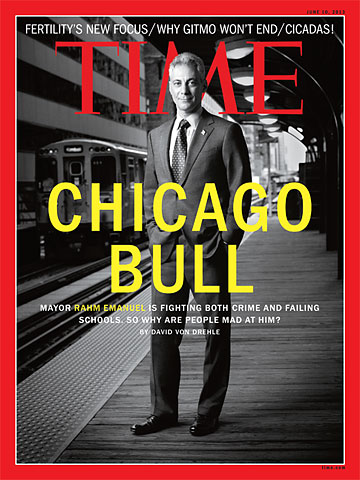
(2 of 7)
That approach won elections but did not solve big structural problems. Elected in 2011 after 22 years of Richard M. Daley, Emanuel inherited a cash-strapped city in a flat-broke state. Chicago has budget problems and crime problems, problems of inequality and racial division, problems of mutual suspicion and failing schools, of high unemployment and aging infrastructure. And behind it all, special interests so deeply entrenched you need spelunking gear to go after them.
But Emanuel has picked the fights his predecessors avoided. His confrontational approach, he says, is the city's best chance to retain its perch as the country's third largest city, a Midwestern metropolis with global ambition--and to avoid a grim Rust Belt future. "The decisions we make in the next two to three years will determine the face of Chicago for the next 20 to 30 years," he says. And given his bona fides at the highest levels of the Democratic Party--former White House chief of staff for President Obama, go-to Congressman during the rise of Nancy Pelosi, senior adviser to former President Bill Clinton--his clash with the left may prove to be a proxy for a broader fight nationwide over the identity of the Democratic Party. Some of the same constituencies attacking Emanuel have beefs with Obama over such issues as drone strikes, Guantánamo and, yes, education reform. But they have been reluctant to take on a trailblazing President in his second and last term in office.
The mayor of Chicago is a different matter.
With millions banked for his next campaign, a firm grip on the city council and the teachers at a loss so far to recruit a suitable opponent, Emanuel still packs plenty of punch. He is, after all, Rahm--the rare Washington insider with enough zing to be on a first-name basis with people he has never met. Legendary for his F bombs and swagger, he has star power in Washington, Hollywood and certain parts of Manhattan sufficient to attract the gaze of Robert Redford, who recently announced plans for an eight-part reality series, Chicagoland, featuring the "tough, visionary mayor" (Redford's words) front and center.
But his approach to running Chicago makes it easy to believe his insistent denials that he would flee the city's problems for a return engagement in Washington. When I ask him during an interview whether he is dreaming of the presidency one day, he replies, "No. I'm not. Never. It is not happening. I don't know how else to say it. No." The mayor has deep-set eyes that gather shadows in their sockets, and this can make him look ominous when he stares, which he was doing intensely. I braced for an F grenade, but nothing detonated. As mayor, he has cleaned up his language--a little.
"I'm done with that," he said of Washington's gridlock and posturing. "I worked eight years in the White House for two great Presidents. They talk about things they want to do--I'm doing it. This is the happiest I've ever been in public life. I've always wanted to be mayor."
